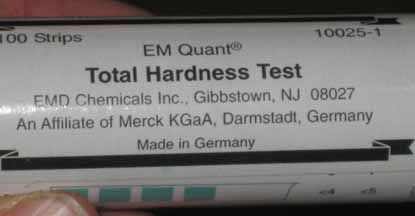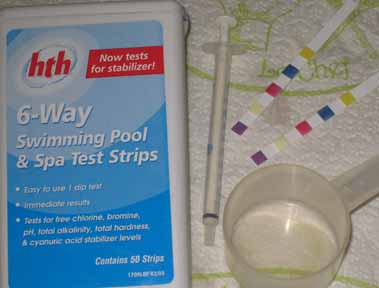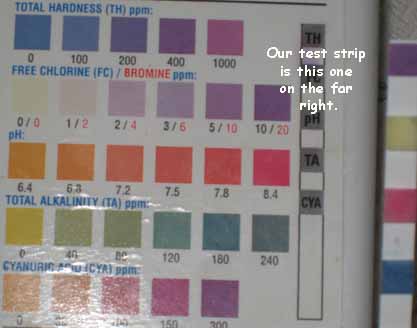Milk Test Strips as Foaling Predictors
I Am Ranch Miniature Horses is
sharing with you what we do to maintain the health of our horses. This
is not intended to direct you on how to care for your horse. The intent of
this is only to share what we do, and raise questions for you. We
advise you to consult your veterinarian before making any changes in
your horse's health care. The information found on our
website is not to supersede the advise of your veterinarian. I AM Ranch
Miniature Horses cannot be held liable for the care of your horse(s).
Milk test strips are really just strips that folks use to test the total
water hardness in swimming pools. Remember that this predictor of foaling
must be read and interpreted in concert with all the other signs of
foaling.
Click
here to read the signs of foaling that we have observed. It seems
that most of the "signs of foaling" vary from mare to mare, but the
changes in the milk just before foaling are the most reliably consistent
factor.
After testing numerous mares,
I prefer the EM Quant Total Hardness Test strips. They are about 98% reliable
When the strips have failed to predict a birth (2 times after testing many,
many mares) the mare has had a dystocia (malpresentation of
foal). Thus far, it has also been false positives and never a false
negative.
|
Total Hardness Strips: I bought
ours from Nurenberg Scientific Supply in Portland for about $60 for 100
strips. They can be ordered by phone at (503) 246-8297. I
cut our strips in half to make them last longer. Keep the test strips in
the frig, per the manufacturers directions. They can be used from one
year to the next, but keep them sealed and refrigerated. These strips
give you details about the changing calcium level in a mare's milk. There are 4 squares on the strip.
If all 4 squares change color within 60 seconds after dipping, I know we
will meet baby within 24 hours. My adrenalin rush keeps my up all night
to watch the cameras and spread straw. Read more about the
procedure below.
|

Click here to see a movie of us
testing a mare's milk using the Total Hardness
Strips!
Click here to see another
movie of us testing a mare's milk using the Total
Hardness Strips!
|
Procedure for both types of strips:
-
Rinse all utensils
to be used with Distilled water to remove any calcium particles that
are present from your tap water. Test at
room temperature. In a cold temp., the speed with which the
chemical reaction occurs can be slowed. Measure precisely.
-
Milk the mare into one cup. Don't overmilk.
For miniatures, we add .5 cc milk to 3cc water. (For big horses, use
1cc milk to 6 cc
water)
-
Measure 3 cc of distilled water into a second cup. Keep the
distilled water clean.
-
In the small syringe, draw up .5
cc of milk and squirt it into the 3cc of water. FLUSH the syringe
in the distilled water at least once. This is such a small sample
that it can affect the test if you leave milk in the syringe.
-
Dip each strip for
4 seconds, which which has four color blocks on it, and
time
exactly 1 minute.
Hold your breath and read the results.
Analysis of the
"Total Hardness Strip":
(the blocks change from green to purple)
-
1-2 blocks changed --
Rest easy tonight. Sleep while you can to store up for
your night of mare stare! Your mare is not even close. The milk will be clear sticky fluid or slightly cloudy, and
probably hard to get. Test every other day.
-
3 blocks changed --
Pick up testing your mare to daily, but always test at the same
time. The milk will be cloudy, and may almost be white.
In my pre-milkstrip days, I would already be losing sleep, for the
mare will look ready to pop right now
-
3 blocks change right away,
4th changing if strip is left out after 1 minute -- Not yet.
Continue as above...
-
4 blocks changed WITHIN 60
SECONDS -- Spread the straw, put on the coffee pot, get your
foaling kit in order,
hook up your trailer. I will be having my daughters with me in the
bedroom helping me watch the cameras! You are within
48 hours of foaling, probably closer to 24 hrs or less. The milk may
be white. The faster the squares change, the closer you are!
|
We were testing with just one type of milk strip (Total Hardness) and
had 100% success rate until Jewel came along. One night we tested her
milk and confidently said we were having a baby after making a funny
Pink Panther video.
We were very confident until morning came and Jewel still was hiding her
little one. Five more nights went by with the same result. A
breeder friend encouraged me to also test her pH levels. They quickly
revealed that her pH level was too high for foaling in the near future.
Ironically, this breeder friend also had great success with the Total
Hardness strips until her mare, Crystal, fooled her. This makes me
conclude that one should not name a mare after any gem!
Prior to Jewel's
pregnancy, we were only using the Total Hardness Strips. To read a 'case
study' of a mare close to foaling,
click here...
This page was made before Jewel.
To see
our documentation of the milk strips and photographs from 2007,
click here..
You can read
about our Jewel's progression by
clicking here.
Of course,
we look at all the other signs of
foaling and take them into account with every mare.
We still only test
using only the Total Hardness Strips above, but every now and then, we
will use the "hth 6-Way Swimming Pool and Spa Test Strips" also.
(Click here to see a video where we use BOTH strips on 2 mares) The
Total Hardness Strips have 4 squares that reveal Calcium levels, and
over time, they have been clearer and easier to read.
|
hth 6-Way Swimming Pool and Spa Test Strips-
These only cost about $10. They test calcium levels in addition to the
pH but this strip only has one square to illustrate calcium level.
That is why, I rely on the "Total Hardness Strips". The procedure for
testing with this 6-Way strip is the same, so it is easy to test
both at the same time.
|

Click here to see us
testing a mare's milk using the 6-Way
Swimming Pool Strip |
|
Analysis of the
6-Way Swimming Pool Strip:
If it is
your mare's big night, the calcium levels must be high and
the pH levels must be low. The pH levels are indicated by
the 3rd square on the strips. In this photo, the mare is not
ready which indicated by the reddish pink color. When she is
ready to foal, the pH level will be below 7.2 and the square
will be more orange.
The
calcium level is also tested by this strip and is indicated
by the purple square (far left square). They are purple in
this photo which means that the calcium level is high. But
both indicators need to change correctly for me to lose
sleep.
|
 |
|

